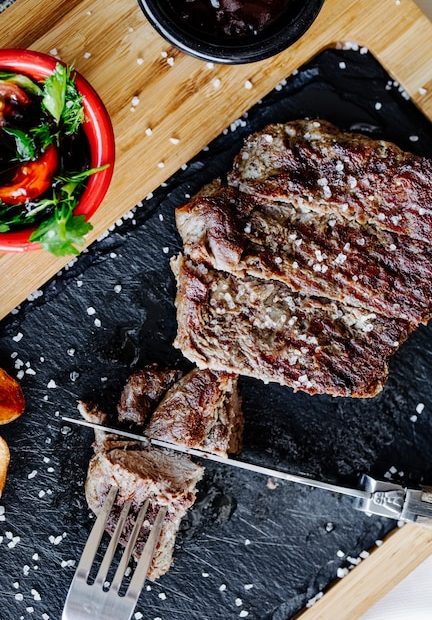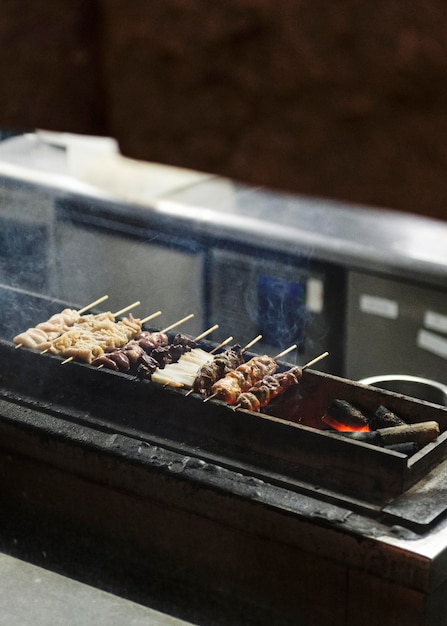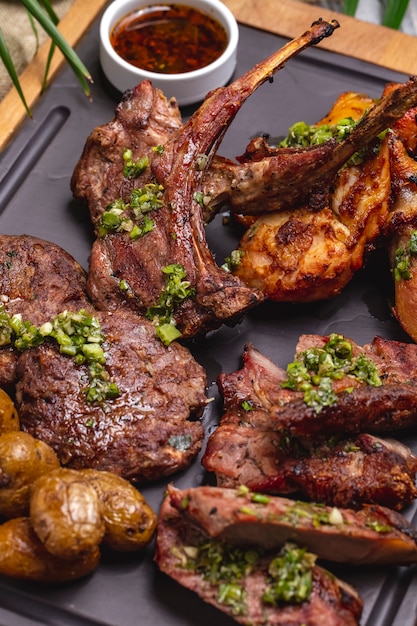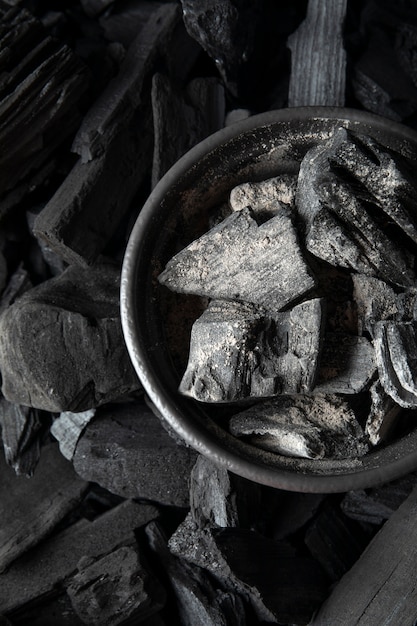Is BBQ Beef Healthy?
When it comes to enjoying a good BBQ, beef is often a popular choice. Whether it’s in the form of mouthwatering steaks, juicy burgers, or succulent ribs, there’s no denying the appeal of grilled beef. However, with increasing concerns about health and nutrition, many people wonder if indulging in BBQ beef is actually a healthy choice.
The Nutritional Benefits of BBQ Beef
Despite its reputation for being high in fat and calories, beef can actually be a valuable source of essential nutrients. It is rich in protein, which is important for muscle growth, repair, and overall health. Beef also provides vitamins and minerals such as iron, zinc, and B-vitamins, all of which play crucial roles in maintaining our body’s functions.
Grilling beef can help to retain some of its nutritional value. The high heat of the grill allows excess fat to drip away, resulting in leaner meat. However, it’s important to note that the way beef is prepared and cooked for BBQ can significantly impact its overall healthiness.
The Potential Health Risks of BBQ Beef
While BBQ beef can offer nutritional benefits, there are also some potential health risks associated with certain aspects of the cooking process. One of the main concerns is the formation of harmful compounds, such as polycyclic aromatic hydrocarbons (PAHs) and heterocyclic amines (HCAs), which can develop when meat is cooked at high temperatures.
PAHs and HCAs are known to be carcinogenic and have been linked to an increased risk of cancer. When fat drips onto hot coals or flames flare up, these compounds can be produced and absorbed by the meat. To reduce the formation of these harmful substances, proper BBQ techniques should be followed, such as using indirect heat and minimizing flare-ups.
Tips for Enjoying Healthier BBQ Beef
While it’s important to be mindful of the potential health risks, there are ways to enjoy BBQ beef while still maintaining a balanced diet. Here are some tips:
- Choose lean cuts of beef: Opt for cuts that have less visible fat marbling.
- Trim excess fat: Remove any excess fat from the meat before grilling.
- Marinate the meat: Marinating beef prior to grilling can help reduce the formation of harmful compounds.
- Use lower cooking temperatures: Cooking beef at lower temperatures for a longer period of time can help minimize the production of PAHs and HCAs.
- Add more vegetables: Incorporate vegetables into your BBQ meal to increase the overall nutritional value.
In Conclusion
While BBQ beef can be a delicious and enjoyable part of a balanced diet, it’s important to be mindful of the potential health risks associated with certain cooking methods. By choosing lean cuts, trimming excess fat, and following proper grilling techniques, you can still savor the flavors of BBQ beef while minimizing the intake of harmful compounds. Remember to enjoy BBQ beef in moderation as part of a varied and nutritious diet.
What are the Health Risks of Charred Beef?
Charred beef, often a popular choice for many barbecue lovers, can pose potential health risks when consumed regularly. The charred or blackened areas on beef are produced by high-temperature cooking methods such as grilling or pan-frying, which can result in the formation of harmful compounds.
Harmful Compounds:
When beef is cooked at high temperatures, certain chemicals form, including heterocyclic amines (HCAs) and polycyclic aromatic hydrocarbons (PAHs). These compounds have been linked to an increased risk of cancer.
Heterocyclic Amines (HCAs): HCAs are formed when amino acids, creatine, and sugars react at high temperatures. They have been shown to cause changes in DNA that could lead to cancer development, particularly stomach, colorectal, pancreatic, and prostate cancers.
Polycyclic Aromatic Hydrocarbons (PAHs): PAHs are formed when fat and juices from meat drip onto open flames or hot surfaces, causing smoke and flames. When these gases and smoke come into contact with the meat’s surface, PAHs are deposited. Prolonged exposure to PAHs has been associated with an increased risk of lung, liver, and skin cancers.
Prevention:
While it may be challenging to completely avoid charred beef, there are steps you can take to minimize the health risks:
- Cooking methods: Opt for cooking methods like baking, broiling, or steaming instead of grilling or pan-frying, as they produce fewer harmful compounds.
- Marinating: Marinating beef in a mixture containing lemon juice, vinegar, or herbs can help reduce the formation of HCAs by up to 96%.
- Trimming fat: Trimming excess fat from the meat before cooking can help minimize the production of harmful compounds.
Expert Insight:
“Consuming charred beef occasionally is unlikely to have significant long-term health effects. However, it’s essential to balance your diet with other healthier cooking methods and a variety of foods to minimize potential risks.” – Dr. Sarah Thompson, Nutritionist.
Overall, while charred beef may be delicious, it’s important to be mindful of the potential health risks associated with its consumption. By opting for alternative cooking methods and implementing preventative measures, you can still enjoy beef while reducing your exposure to harmful compounds.
How can you make beef BBQ healthier?
Introduction
Barbecue season is upon us, and for many people, that means indulging in mouth-watering grilled dishes. However, traditional barbecues tend to involve fatty cuts of meat, sugary sauces, and unhealthy sides. If you’re looking to keep your summer grilling sessions both delicious and nutritious, we’ve got you covered!
Choose Lean Cuts of Beef
When it comes to making your beef BBQ healthier, start by opting for lean cuts of meat. Look for options such as sirloin, tenderloin, or flank steak. These cuts tend to have less marbling and lower fat content, reducing the overall caloric intake without compromising flavor.
Marinate to Reduce Carcinogens
Marinating your beef before grilling not only adds flavor but also helps reduce the formation of carcinogens. Certain ingredients like citrus juices, vinegar, garlic, and herbs can act as natural marinades that inhibit the production of harmful compounds when the meat is cooked at high temperatures.
Add Colorful Vegetables
Amp up the nutritional value of your BBQ by incorporating plenty of colorful vegetables into your grilling session. Add slices of bell peppers, zucchini, eggplant, or mushrooms to the grill. These veggies are rich in vitamins, minerals, and dietary fiber, providing a healthy balance to your meal.
Opt for Homemade Sauces and Rubs
Store-bought barbecue sauces often contain excessive amounts of sugar, sodium, and artificial additives. Consider making your own homemade marinades, rubs, and sauces using fresh ingredients and reducing the amount of added sugars. This way, you have better control over what goes into your meal and can create flavors that suit your taste buds.
Be Mindful of Portion Sizes
Eating a healthy BBQ also involves being mindful of portion sizes. While beef is a great source of protein, too much of it can lead to excessive calorie intake. Aim for a deck-of-cards-sized portion of meat per person and fill the rest of your plate with vegetables and healthy sides.
Is BBQ beef carcinogenic?
Barbecuing is a popular cooking method, especially during the summer months in the UK. The smell of sizzling meat on a grill can be irresistible. However, there have been concerns about the potential health risks associated with consuming BBQ beef.
What makes BBQ beef potentially carcinogenic?
When meats are grilled at high temperatures or over an open flame, it can lead to the formation of certain chemicals that have been linked to cancer. These chemicals include polycyclic aromatic hydrocarbons (PAHs) and heterocyclic amines (HCAs).
PAHs are formed when fat and juices from the meat drip onto the hot coals or flames, causing smoke to rise and coat the meat. HCAs, on the other hand, are produced when amino acids, sugars, and creatine in meat react at high temperatures.
Research suggests that long-term exposure to these compounds may increase the risk of certain types of cancers, including colorectal, pancreatic, and prostate cancer.
How to mitigate the risks
While the potential risks are concerning, there are measures you can take to make your BBQ beef safer:
- Cooking methods: Use indirect grilling or pre-cook the meat partially to reduce the time it spends over direct heat.
- Marinating: Marinating the meat before grilling can help reduce the formation of HCAs.
- Trimming fat: Trimming excess fat from the meat can minimize the amount of fat drippings and reduce the production of PAHs.
- Flipping frequently: Flipping the meat frequently can also help reduce the formation of harmful compounds.
- Using foil: Placing a layer of aluminum foil on the grill can help prevent direct contact between the meat and the flames.
Remember: Moderation is key. Enjoying BBQ beef occasionally as part of a balanced diet is unlikely to pose significant health risks.
“By implementing these precautions, you can continue to enjoy delicious BBQ beef while minimizing potential health risks.”
It’s important to note that the risks associated with BBQ beef are not unique to this cooking method but can also apply to other forms of high-temperature cooking, such as frying or broiling.
| Cooking Method | PAHs (ng/g) | HCAs (ng/g) |
|---|---|---|
| Grilling | 2,000 | 4,500 |
| Broiling | 1,500 | 3,000 |
| Frying | 200 | 1,000 |
While it’s essential to be aware of the potential risks, enjoying BBQ beef in moderation and taking precautions can help minimize any potential harm.
Conclusion
With these tips, you can enjoy a healthier and more nutritious beef BBQ without sacrificing taste. By choosing lean cuts, marinating, adding colorful vegetables, making your own sauces and rubs, and controlling portion sizes, you’ll create a well-balanced and satisfying meal. So fire up the grill, experiment with new flavors, and have a fantastic barbecue season!



